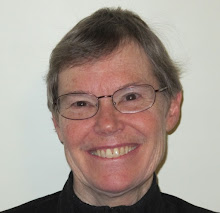I have fond memories of visiting Bela and Stella's home at Locust Lawn. Inside a small run-down barn, they had created a cozy and beautiful home, and they welcomed us --little girls from down the hill-- cheerfully. Bela was Hungarian; his wife was German.
I wish now that I knew more about how they came to Danvers and what their lives were like as they became American citizens and moved on to raise a family elsewhere. My role in their story was short-term, yet significant, said Stella, who credited me with helping her learn English. I do know that they were D.P.s (Displaced Persons) sponsored by my grandfather after World War II. Today I found this webpage that provides some context: Displaced Person Transports: Cargo of Hope (American Merchant Marine at War, www.usmm.org).
[Note added 12/09: see my December column, New inhabitants in an old barn, about my experience visiting Stella and Bela.]
Monday, September 28, 2009
Thursday, September 10, 2009
Granddaddy's yard
I now attend a weekly writing class called "Fun with Writing" at the local Senior Center. Recently we chose to write about childhood games we remember. I wrote about Kick-the-Can, an active game played in summer evenings with my family. We always played it in the yard next door, where my grandparents lived. Granddaddy Nichols was a good sport and often joined the game. How lucky I was to have Granddaddy next door! Visualizing those games of Kick-the-Can helped me visualize his house, driveway, and garage, and the little playhouse he built for us. For this month's column, I wrote about playing at Granddaddy's: "Playing at Granddaddy's was great."
Here's the version I read at writing class:
Playing at Granddaddy's
By Sandy Nichols Ward
What fun it was to have Granddaddy Nichols living right next door! When Jean and I were young, he built a playhouse in his backyard just for us. It had one window looking out on the hayfield beyond his yard. There was room inside for a small table and two little chairs. The side walls each had a hinged section of boards we could prop open, adding "window" space and allowing breezes to flow through. We spent many hours in and around that playhouse. Sometimes it was a doll house, sometimes a fort as we fought off imaginary invaders; sometimes it was a clubhouse with our neighborhood friends. The playhouse was also a handy hiding place during games of Kick-the-Can.
On summer evenings after supper, adults and children would gather at Granddaddy's for the popular game of Kick-the-Can, a variant of hide-and-seek. An old tin can was placed in the center of a chalked circle on the driveway. The person who was "It" tried to guard the can while also running around looking for hidden players and calling out the names of people who were spotted. "Sandy, I see you!" Oops… I'd have to come out of hiding and stand as a captive in the central area -- at least until someone rushed out of hiding to kick that can and release me and any other captives. While the It was busy retrieving the kicked can, we'd all have a chance to hide again. This was serious fun, with much running and team work. Captives would try to signal to friends when it was safe to come kick the can. The It would of course try to spot (and call out to capture) anyone who approached the can.
There were many ideal hiding places from which we could peek out and see the central area. The overgrown evergreens along the sunporch provided a dark narrow space where several friends could hide at once. The hedge along the garden was another one, though that vegetation wasn't quite thick enough to conceal us entirely. The big buildings --the house and garage-- were also in the game, as you could run all the way around the back of each, though it was hard to keep track of what was happening at the can if you got so far away.
Everyone could play Kick-the-Can. We usually had three generations actively involved: Granddaddy, my mother and father, and my sister and I, as well as neighborhood friends such as Ray, Gordon and Janet. Sometimes cousin Bill or other relatives joined in. We'd play until the daylight dimmed or the mosquitoes bothered us. Good fun for all ages.
Another outdoor game was croquet.This was played primarily by the older generations --my great aunts and grandparents and their friends-- on the front yard. I didn't think it was as much fun as Kick-the-Can, perhaps because I lacked the skill to hit a croquet ball accurately and powerfully enough to get through each wicket on the first try.
My parents loved active outdoor games. They believed we should play outside on sunny days. If Jean and I were indoors engrossed in one of our favorite card games such as Go Fish, Mommy would shoo us out of the house. "Go outside and play!" We'd stuff the cards in our pockets and run over to Granddaddy's, where we could resume our card game undisturbed in his big garage! We enjoyed the cool expanse of concrete on which we could spread out our cards or other games, shaded from the sun. I don't know if Mommy ever figured this out. She knew we were safe next door, so she never needed to come check on us. She'd ring a bell when it was time for us to come home for a meal.
Subscribe to:
Posts (Atom)
